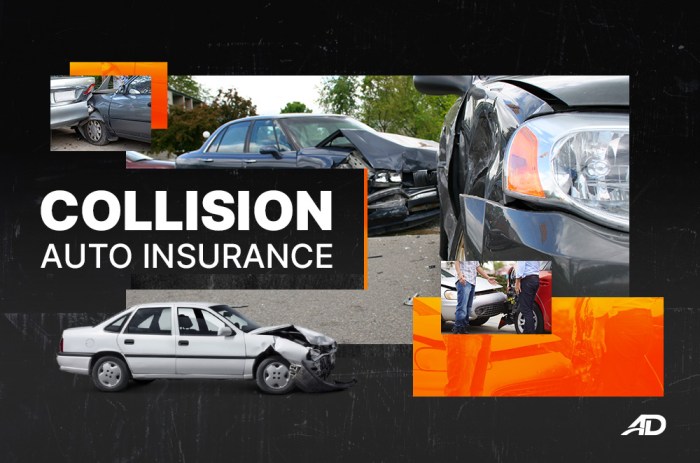Delving into Collision insurance for rental cars, this introduction immerses readers in a unique and compelling narrative, with a focus on the importance of understanding the intricacies of collision insurance when renting a car. From coverage limits to real-life scenarios, this topic explores all aspects of collision insurance to equip you with the knowledge needed for a seamless rental experience.
When it comes to renting a car, collision insurance is a crucial component that can make a significant difference in your overall rental experience. Understanding the differences between Collision Damage Waiver (CDW) and Collision Insurance, along with factors influencing rates and the claims process, is essential for making informed decisions and ensuring peace of mind while on the road.
What is Collision Insurance for Rental Cars?

Collision insurance for rental cars is a type of coverage that helps pay for repairs or replacement of the rental vehicle if it is damaged in a collision or accident. This insurance is optional but can provide peace of mind and financial protection during your rental period.
Parents of teenage drivers often wonder about the best options for liability insurance for teenagers. Finding the right coverage that balances cost and protection is key to peace of mind on the road.
Examples of Situations Where Collision Insurance is Beneficial
- Getting into a fender bender while navigating unfamiliar roads in a different city.
- Accidentally scraping the rental car against a pillar in a crowded parking lot.
- Colliding with another vehicle while trying to merge onto a busy highway.
Coverage Limits and Exclusions of Collision Insurance, Collision insurance for rental cars
Collision insurance typically comes with coverage limits, which may vary depending on the rental company and the specific policy. It is essential to read the terms and conditions to understand the deductibles and maximum coverage amounts. Additionally, collision insurance may not cover damages resulting from reckless driving, driving under the influence, or driving on unpaved roads.
When it comes to liability insurance, each state has its own set of requirements that drivers must adhere to. Understanding the liability insurance requirements by state is crucial to ensure compliance and protection in case of accidents.
Comparison with Other Car Rental Insurance Options
Collision insurance is often compared to other types of car rental insurance, such as liability insurance, personal accident insurance, and personal effects coverage. While collision insurance focuses on vehicle damage in a collision, liability insurance covers damages to other vehicles or property. Personal accident insurance provides coverage for medical expenses resulting from an accident, and personal effects coverage protects your belongings inside the rental car.
Choosing the right insurance provider is essential to ensure reliable coverage. Researching the best-rated liability insurance providers can help you make an informed decision that meets your needs and budget.
Understanding Collision Damage Waiver (CDW) vs. Collision Insurance.

When renting a car, understanding the difference between Collision Damage Waiver (CDW) and Collision Insurance is crucial to make an informed decision. Both options provide coverage in case of damage to the rental vehicle, but they have distinct advantages and disadvantages.
Differentiate between Collision Damage Waiver (CDW) and Collision Insurance.
- Collision Damage Waiver (CDW): CDW is not insurance but a waiver that relieves you of financial responsibility if the rental car is damaged or stolen. It typically comes with an excess amount that you need to pay in case of an incident.
- Collision Insurance: Collision Insurance, on the other hand, is a type of insurance policy that covers the cost of damages to the rental car after a deductible is met.
Advantages and Disadvantages of opting for CDW or Collision Insurance.
- Advantages of CDW: CDW can provide peace of mind by reducing or eliminating your financial liability in case of damage to the rental car. It may also cover loss of use charges by the rental company.
- Disadvantages of CDW: CDW can be expensive, and the coverage may have limitations or exclusions that could leave you liable for certain damages.
- Advantages of Collision Insurance: Collision Insurance offers more comprehensive coverage for damages to the rental car, potentially covering a wider range of incidents.
- Disadvantages of Collision Insurance: Collision Insurance may come with a higher premium compared to CDW, and you may still be responsible for a deductible in case of an accident.
Tips on when it might be more beneficial to choose one over the other.
- If you already have coverage through your personal auto insurance or credit card, opting for CDW may be redundant, and Collision Insurance could offer more comprehensive protection.
- Consider the cost of each option and weigh it against the potential risks to decide which coverage is more suitable for your situation.
Real-life scenarios where CDW or Collision Insurance played a significant role.
- Scenario 1: A traveler declined CDW and relied on their credit card’s rental car insurance. However, when the rental car was damaged, they discovered that the credit card coverage had limitations, leaving them with out-of-pocket expenses.
- Scenario 2: Another traveler opted for Collision Insurance and was involved in a minor accident. The Collision Insurance covered the damages to the rental car, and they only had to pay the deductible, avoiding significant financial loss.
Costs and Factors Influencing Collision Insurance Rates

When renting a car, collision insurance can significantly impact the overall cost. Understanding the factors that influence collision insurance rates can help you make informed decisions and potentially save money.
Factors Influencing Collision Insurance Rates
- The Value of the Rental Car: Higher valued rental cars typically come with higher collision insurance rates as the cost to repair or replace the vehicle in case of damage is greater.
- Driver’s Age and Driving Record: Younger drivers or those with a history of accidents may face higher collision insurance rates due to the perceived higher risk of accidents.
- Rental Car Company Policies: Different rental car companies may have varying collision insurance rates based on their own risk assessments and coverage options.
How Rental Car Companies Determine Collision Insurance Rates
- Assessment of Risk: Rental car companies evaluate factors such as the driver’s age, driving record, and the type of vehicle being rented to determine the level of risk and subsequently set collision insurance rates.
- Insurance Coverage Options: Rental car companies may offer different levels of collision insurance coverage, each with its own associated cost, allowing renters to choose based on their needs and budget.
Tips to Potentially Lower Collision Insurance Costs
- Check Your Existing Insurance Policies: Your personal auto insurance or credit card may already provide coverage for rental cars, potentially reducing the need for additional collision insurance.
- Opt for Higher Deductibles: Choosing a higher deductible can lower your collision insurance premium, but be sure you can afford the out-of-pocket cost in case of an accident.
Comparison of Collision Insurance Rates Across Rental Car Companies
- Shop Around: Compare collision insurance rates from multiple rental car companies to find the best deal for your specific rental situation.
- Consider Membership Discounts: Some rental car companies offer discounts on collision insurance rates for members of certain organizations or loyalty programs.
Filing a Claim for Collision Damage: Collision Insurance For Rental Cars
When it comes to filing a claim for collision damage with a rental car company, there are specific steps and documentation required to ensure a smooth and efficient process.
Step-by-Step Guide for Filing a Claim
- Immediately contact the rental car company and local authorities to report the collision.
- Document the incident by taking photos of the damage and obtaining contact information from any witnesses.
- Fill out the accident report form provided by the rental car company accurately and completely.
- Obtain a copy of the police report if applicable.
- Review your rental agreement to understand the terms and conditions related to collision damage claims.
- Contact your insurance provider to inform them of the incident and coordinate the claim process.
- Follow up with the rental car company and insurance provider to track the progress of your claim.
Documentation Required for Filing a Collision Damage Claim
- Rental agreement and insurance policy information.
- Accident report form provided by the rental car company.
- Police report (if applicable).
- Photos of the damage and contact information from witnesses.
- Any communication records with the rental car company and insurance provider.
Best Practices for a Smooth Claims Process
- Act promptly and report the collision immediately to the rental car company and local authorities.
- Document the incident thoroughly with photos, witness information, and accurate details.
- Review and understand the terms of your rental agreement and insurance coverage for collision damage.
- Communicate effectively with the rental car company and insurance provider to stay informed about the claim process.
In conclusion, Collision insurance for rental cars is a vital aspect of protecting yourself and your rental vehicle in case of an accident. By grasping the fundamentals of collision insurance, you can navigate the rental process with confidence and peace of mind, knowing that you are well-prepared for any unforeseen circumstances on the road.



